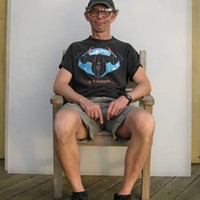He was ubiquitous — a fixture in neighborhoods from downtown to Dilworth, Plaza Midwood to NoDa. He was as much a part of the fabric of Charlotte as Anthony Foxx, Pat McCrory, Jennifer Roberts, Hugh McColl, Harvey Gantt, Billy Graham, Ric Flair or the Panthers. He was Chilly Willy, and this city had a love-hate relationship with him.
Chilly Willy died at 58 on Thursday, Oct. 18, when a car struck him on 7th Street in the Elizabeth neighborhood where he often wandered along the sidewalks, hollering at cars or berating people hanging out at Philosopher's Stone or Jackalope Jack's, or posing for snapshots with bankers or frat boys.
He was one of the first homeless people I struck up a conversation with when I arrived here from New York City in 2002. I was riding my Harley Davidson along Central Avenue in Plaza Midwood when a scraggly guy with a mop of gray hair wandered up to the bike, gesturing wildly and cursing at me for ... well, I didn't really know what for. But I stopped and talked to him. He was by turns acerbic, jovial and surprisingly tender, his personality much bigger and more complex than the cartoon character many made him out to be.
Chilly Willy sometimes played a guitar and sang. And he wasn't bad at it. He could have been a folkie, a country singer, a Southern rocker. Instead, he became a circus act, exploited by late-night partiers who apparently thought his drunkenness was funnier than theirs, who perhaps found comfort in knowing they had washer-dryers to clean their dirty clothes in after a night of bar-hopping. Those people posted videos of their encounters with Chilly Willy on YouTube, or posed with him for pics they'd put on Facebook.
But Chilly Willy wasn't a circus act. He was a real-life embodiment of the stuff we don't like to acknowledge. A true member of the very bottom part of the 47 percent that Mitt Romney would ignore — the homeless, the addicted, the mentally ill, the nameless. Chilly Willy had a name. It was William Major, and he was a human being just like you or me. He had a tough life growing up. He was poor. He drank. He robbed people. He spent some time in prison for it. He suffered from addiction and possibly other mental diseases. He was trapped in a loop he couldn't get out of.
He certainly wasn't the only one. Major was one of more than 800 chronically homeless citizens in this city, according to a 2010 study by Common Ground of New York City and the Urban Ministry Center of Charlotte. He also was one of more than 80 people who loop in and out of the Mecklenburg County jail system for infractions mostly rooted in mental illnesses, according to a 2007 story in The Charlotte Observer. In 2005, those chronic offenders cost taxpayers more than $1 million, the paper reported. At the time of the Observer piece, Major had trekked through the system 20 times in the previous two years, at a cost of $109 a day. Because of our obsession with crime and punishment, we lock these people up, set them free, lock them up again, and set them free again — but we don't treat their illnesses.
The tone of that Charlotte Observer story neatly illustrated how our society still views addiction and other mental diseases. After objectively enumerating the statistics, the reporter for the city's mainstream daily was compelled to add a little commentary: "That doesn't include time spent by the courts or police, or the price neighbors have paid for [Major's] disruptive behavior." The reporter even asked Major why he wouldn't stop drinking.
Chilly Willy's answer was much smarter than the reporter's question: "I wish I could tell you," he said.
______________________
In other sad news in a news-heavy week: On the same day Chilly Willy died, a man charged with brutally killing a former Creative Loafing photographer pleaded guilty to the murder and was sentenced to life in prison without parole.
Chris Radok was only a few years younger than Chilly Willy when he died at 55 last year after stumbling on a home invader who viciously beat and stabbed the photographer to death. The brutal nature of the murder shocked and devastated all of us who knew and cared about Radok, and our hearts go out to his family and many, many friends in the Charlotte area.
Antoine Young pleaded guilty to the murder to avoid capital punishment. We believe this was a just outcome, much more humane for all involved than imposing the antiquated death penalty. We have no idea why Young chose Radok's home, nor why the killer was so brutal, and we'll never know. We do believe, however, that killing the killer would serve no purpose and would not bring Radok back.
We miss Radok at Creative Loafing — we miss seeing him cruising around town on his bicycle and photographing punk bands in his signature fisheye-lens style. And we're delighted that Baku Gallery in NoDa is currently presenting an exhibit of his work, Tar & Nicotine: Photographs by Chris Radok, which runs through Oct. 31. Don't let Radok's death become just another dehumanizing crime statistic — go see his photographs, which keep his passion, creativity and eccentricities alive.



